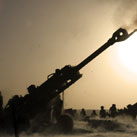Reforming Defence Contracting Procedures
It may perhaps be useful to examine some features of India’s Defence Procurement Procedure (DPP) for streamlining of the capital acquisition process for defence procurement. After all, the DPP may well be the only procurement regulation in the world that discriminates against its own domestic bidders
Defence Reforms – Agenda for the New Government
A country’s response to external threats and internal security challenges is based on its defence preparedness, advance planning for contingencies and the political will. The new government will have to make key decisions on different aspects of defence reforms. This Policy Brief puts forward some suggestions.
Running Low on Ammunition
If we have no qualms about importing from other countries why cannot we buy ammunition from our own private sector companies? While restrictions could apply to production of small arms and ammunition, for large calibre arms and ammunition there is a case for permitting the private sector companies to chip in.
Indian Companies – Need for a Clear Definition
The Defence Procurement Procedure 2013, as also its earlier versions, does not define an Indian company. Some would argue that the answer is very simple: any entity registered in India under the Companies Act, 2013 or any other relevant statute and operating with a valid license, where such a license is required, qualifies as an Indian company, enterprise, institution or establishment.
Cancellation of the VVIP Helicopter Contract: Beginning of a Long haul?
While there was perhaps no option for the MoD but to do what it has done, it would be naive to expect the seller to acquiesce in forfeiture of the bank guarantees, recovery of the sums allegedly paid in violation of the PCIP (assuming that it will be possible to recover this amount) and to simply take the three helicopters back without demur.
Effectiveness of Quality Assurance in Army Procurements
A closed loop feedback system for ensuring the quality of the Army equipment exists. Notwithstanding this, a number of Army equipment show a high failure rate at crucial times and are, therefore, a matter of great concern. These failed equipment have resulted in a number of avoidable casualties as well as restricted operational planning by tactical commanders in the field due to the non-availability of equipment for deployment, which results from their low reliability or high rates of failure.
Reinventing Defence Procurement in India: Lessons from Other Countries and An Integrative Framework
Over the past decade, defence capital acquisition reforms have enhanced standardization, transparency and bigger acquisition budgets. Yet the system grapples with delays, cost escalations and gaps in operational preparedness. This article explores the structure, process and cultural dimensions of the acquisition system, unpacking the underlying linkages between policy, planning, budgeting, strategic direction, and outcomefocused analytical decision-making—factors that influence effectiveness of the procurement system.
















